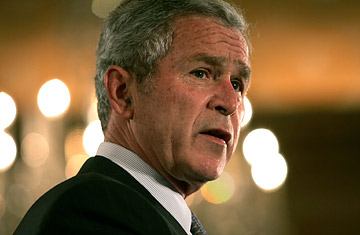
No one is watching President Bush's trip to the Middle East closer than his potential successors. For Barack Obama, whose candidacy is built on change, it's a chance to remind some voters what they want change from. For John McCain it's test of his strategy of backing Bush in theory, while edging away from him in practice. But for all the distinctions the two draw between each other, and Bush, the next President's approach to the Middle East may look like this one's. "A lot of what's going to happen there is beyond our control," says Robert Hunter a senior advisor of the RAND corporation and a former U.S. Ambassador to NATO.
The President's first stop is Israel for the country's 60th anniversary celebrations. While there, he will also do some tourism (including a visit to the Dead Sea Scrolls) and discussions on the peace process with Prime Minister Ehud Olmert. He then flies to Saudi Arabia Friday for talks with King Abdullah at his ranch outside Riyadh. Bush will press the Saudi king on oil prices, though he's already played down the possibility of much change. He finishes the trip Saturday and Sunday in Egypt at a summit of Arab leaders, where Iran and the peace process will be the focus of talks.
At each stop, Bush will be dealing with vexing challenges that aren't about to disappear because of a change in the Oval Office. Obama says he will end the war in Iraq, but his own advisors admit that any U.S. troop drawdown would depend on advice from ground commanders and would be unlikely to get the U.S. all the way out soon. McCain criticizes much of Bush's approach to Iraq, but says now that we're there, we have to stay and win. Both men will find the diplomatic and military options for changing Iran's nuclear ambitions and anti-Israel stance as limited and ineffectual as Bush does. And if the President has learned anything from his recent spurt of Arab-Israeli diplomacy, it's that the militant anti-Israel groups, Hamas and Hizballah, are permanent, and intransigent, obstacles to the peace process.
Are the limits to change that Bush's successor will encounter intentional or accidental? Certainly Bush's missteps in the region have tied his successor's hands, committing the U.S. to a stabilizing presence in and around Iraq and strengthening Iran to the point that it does not need to deal. But in negotiating a long-term military relationship with Baghdad and backing Israel's redrawing of its borders, Bush has committed the U.S. to positions it will be difficult, if not impossible, for his successor to change. Privately, Administration officials admit they are trying to lock in some of their policies. Which means by this time next year, Bush's successor will be the one struggling to address public discontent with the U.S. approach to the region.
